Pregnancy after a miscarriage can bring mixed emotions, from joy to anxiety. You’ll have a 20% chance of another miscarriage after one loss, with odds increasing after multiple experiences. It’s best to wait for at least one menstrual cycle before trying again, and many women have successful pregnancies subsequently. Testing and lifestyle changes can boost your chances for a healthy pregnancy. Understanding your emotional readiness is also essential, and there’s more to discover about traversing this journey.
Key Takeaways
- After a miscarriage, the risk of another miscarriage is around 20%, increasing with each subsequent loss.
- Most healthcare professionals recommend waiting for at least one menstrual cycle before trying to conceive again.
- Emotional readiness is crucial; seeking support from professionals or support groups can help manage feelings of grief and anxiety.
- Maintaining a healthy lifestyle, including a balanced diet and prenatal vitamins, can enhance chances of a successful subsequent pregnancy.
- Pregnancy can occur as soon as two weeks after a miscarriage, and conceiving within three months often leads to better outcomes.
Understanding Miscarriage and Its Causes
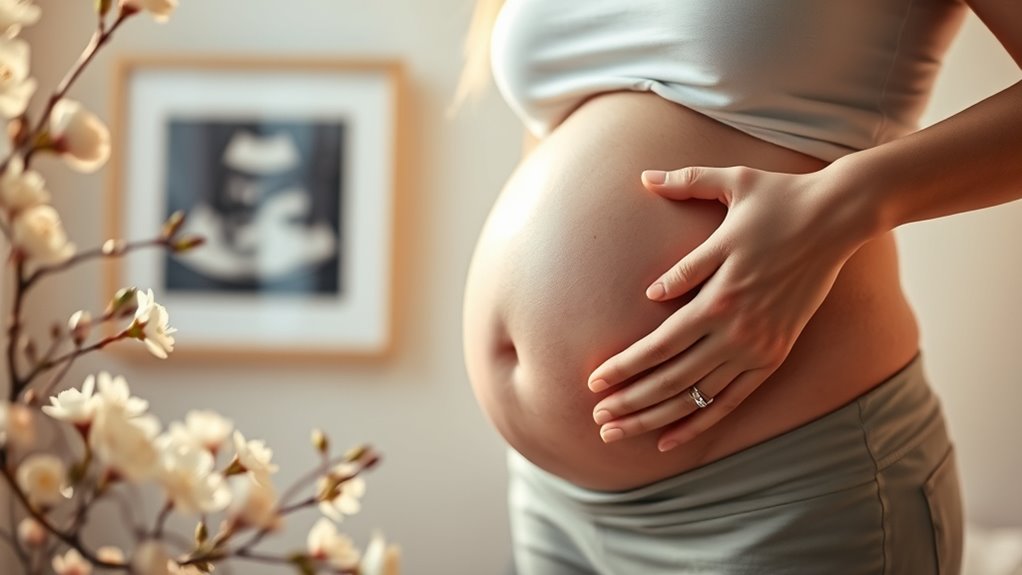
Miscarriage, which refers to the unplanned loss of a pregnancy before the 20th week, can be a deeply emotional experience for many. Understanding miscarriage involves recognizing that over 50% of early pregnancy losses are due to chromosomal abnormalities in the embryo. These abnormalities become more common as you age, increasing your risk of miscarriage. Additionally, specific health conditions like poorly controlled diabetes or uterine issues can contribute to this risk. It’s important to remember that activities such as working or exercising don’t cause miscarriages.
If you’ve experienced a miscarriage, seeking emotional support can be vital for healing. Engaging in mindfulness and relaxation techniques can help you cope with the emotional challenges during this time. Research indicates that small mistakes related to self-care may hinder your recovery process. With the right understanding and care, you can increase your chances of a successful pregnancy in the future. Establishing clear routines and seeking support can create a more stable environment for your next pregnancy.
Odds of Another Miscarriage
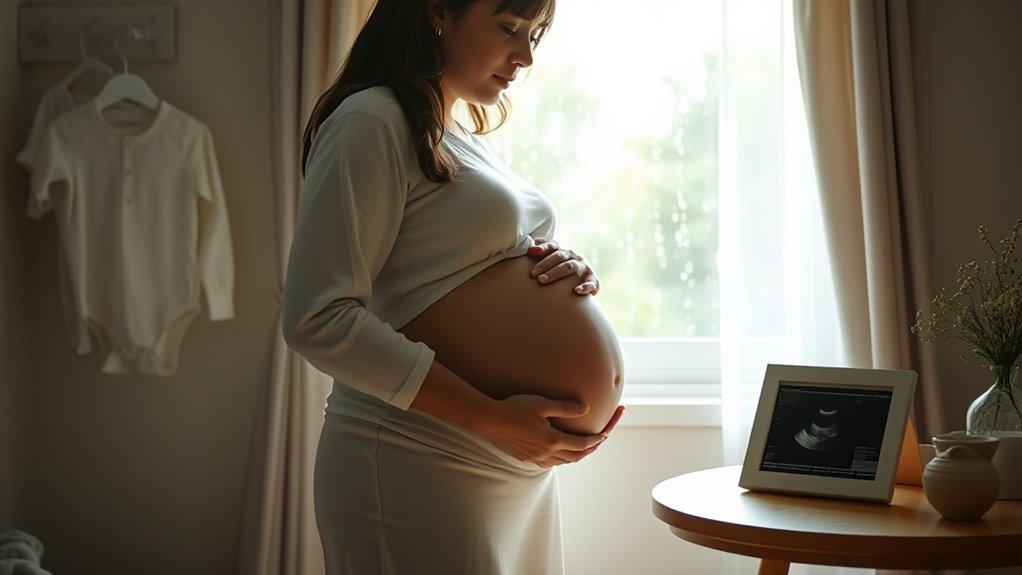
Experiencing a miscarriage can leave many wondering about the chances of future pregnancies. The odds of another miscarriage can be concerning, especially if you’ve faced multiple losses.
After one miscarriage, your risk is around 20%. This increases to about 25% after two losses and can rise to 30% to 40% after three or more. It’s also important to understand that factors such as genetic predisposition can play a role in miscarriage risk.
However, it’s vital to remember that most individuals experience only one miscarriage and go on to have healthy pregnancies. In fact, approximately 85% of women successfully conceive and carry a pregnancy to term after a miscarriage. Nighttime meditation may also support emotional well-being during this time.
Emotions may amplify your perception of risk, but staying positive and focusing on trying for a healthy pregnancy is essential.
Timing Your Next Pregnancy
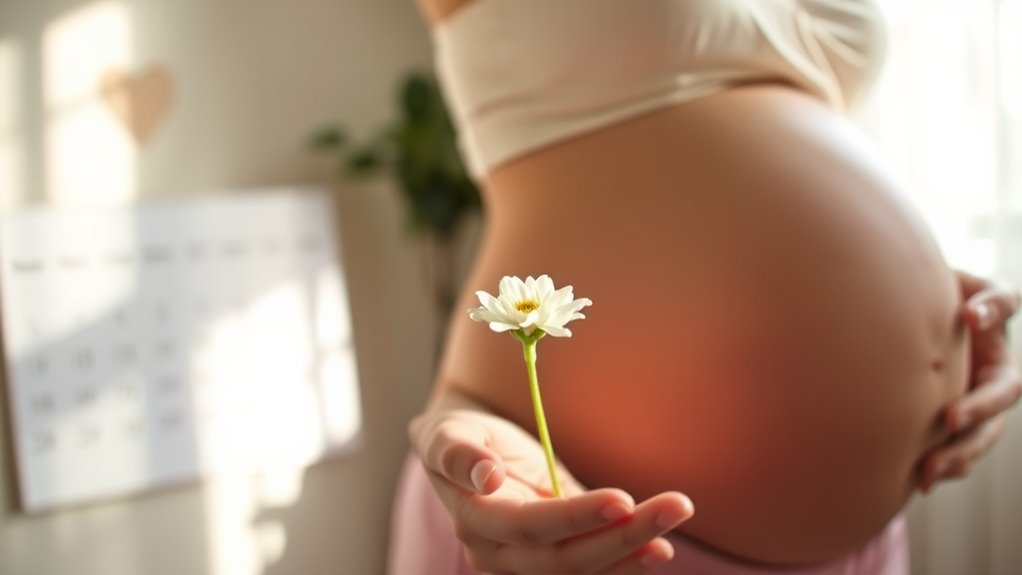
When considering the right time to try for another pregnancy, it’s important to prioritize both physical and emotional recovery.
Most healthcare professionals recommend waiting for at least one menstrual cycle after a miscarriage before trying to conceive again. This allows your body and mind to heal. Notably, pregnancy can happen as soon as two weeks post-miscarriage, as ovulation may occur before your first period. Understanding the significance of long-term financial planning can also provide peace of mind during this emotional journey. Engaging in self-care routines can bolster your emotional well-being and support a healthier mindset as you consider your next steps.
Studies show that women conceiving within three months often experience better pregnancy outcomes. However, evaluating your emotional readiness is vital. Understanding the importance of self-care practices can significantly aid in your recovery process.
Take time to grieve and reflect on your feelings. Consulting with a healthcare professional can help assess your underlying health and readiness to initiate this journey again, ensuring you’re prepared for what lies ahead.
Recommended Tests Before Trying Again

After taking the time to heal emotionally and physically, you might feel ready to contemplate your next pregnancy. Before trying again, it’s crucial to undergo recommended tests, especially if you’ve experienced recurrent miscarriages.
A consultation with a healthcare provider can help you identify which tests are appropriate for your health condition. Genetic testing for both partners can uncover chromosomal abnormalities that may contribute to miscarriage risk.
Additionally, blood tests can assess hormone levels and immune system function, offering insights into factors impacting future pregnancies. Early testing can clarify risks for pregnant people and identify reasons for miscarriages about 50% of the time. Understanding common symptoms of conditions that may affect pregnancy can also be beneficial.
Taking these steps can provide peace of mind as you move forward.
Improving Chances of a Healthy Pregnancy
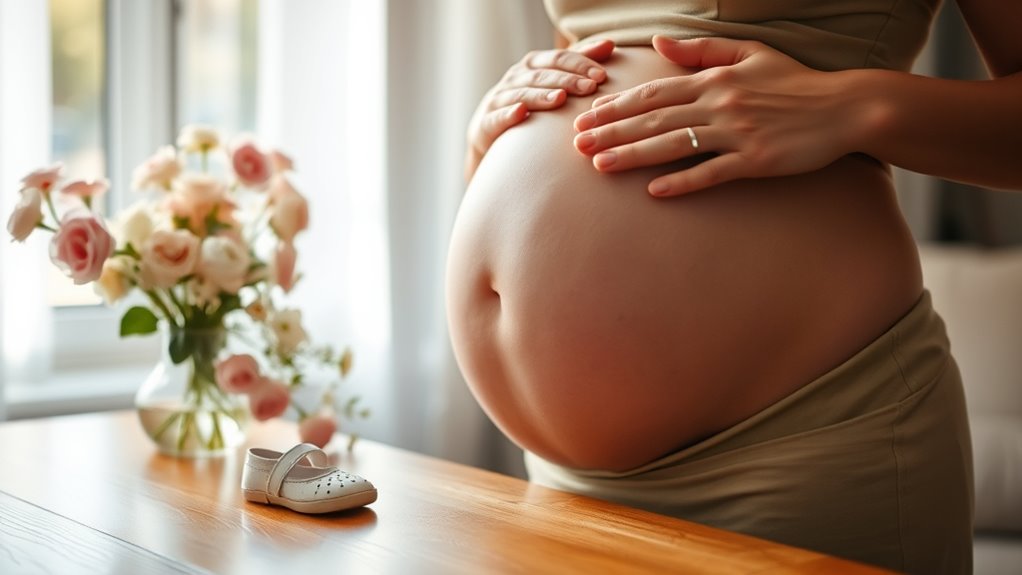
To improve your chances of a healthy pregnancy after a miscarriage, focus on adopting a healthier lifestyle.
Start by maintaining a balanced diet rich in essential nutrients, as this can considerably enhance your reproductive health. Taking daily prenatal vitamins or folic acid supplements before conception is vital for fetal development and can reduce the risk of neural tube defects.
A balanced diet and prenatal vitamins are crucial for enhancing reproductive health and supporting fetal development.
Achieving and maintaining a healthy weight prior to pregnancy will also decrease the risk of complications. Limit caffeine intake to 200 mg per day, and avoid alcohol, smoking, and illegal drugs.
Finally, consulting with a healthcare provider for personalized advice can lead to better pregnancy outcomes and help manage any health conditions you may have.
Emotional and Mental Health Considerations

After a miscarriage, you might find it challenging to process your grief and feelings of loss, which can impact your readiness for another pregnancy.
It’s common to feel anxious about the future, as joy can mix with fear of another loss.
Seeking support from professionals or support groups can help you navigate these emotions and build resilience for the journey ahead.
Processing Grief and Loss
While experiencing a miscarriage can leave you feeling lost and overwhelmed, it’s important to acknowledge and process your grief.
You may encounter a whirlwind of emotions—sadness, anger, and confusion—as you navigate the loss of a pregnancy.
It’s normal to have mixed emotions during subsequent pregnancies, where joy intertwines with lingering pain and anxiety.
Give yourself the time to grieve, and don’t hesitate to seek support from friends, family, or a support group.
Engaging in open discussions about your loss can help normalize your experience and reduce feelings of isolation.
If you ever feel unsure or overwhelmed, talk with your doctor about your emotional well-being, ensuring you’re emotionally prepared when you feel ready for your next steps.
Anxiety and Future Pregnancies
Experiencing a miscarriage can leave lasting emotional scars, making it completely normal to feel anxious about future pregnancies. You might grapple with mixed emotions, feeling joy for a new opportunity while haunted by past loss. It’s essential to process your feelings and allow yourself grace. Remember, approximately 85% of women who experience a miscarriage go on to have healthy pregnancies, which can help ease some anxiety.
| Feelings | Coping Strategies | Support Resources |
|---|---|---|
| Anxiety | Engage in relaxation techniques | Support groups |
| Guilt | Talk about your experiences | Online forums |
| Fear | Journaling | Counseling |
| Mixed Emotions | Mindfulness practices | Friends and family |
Finding emotional support can make a significant difference as you navigate this journey.
Seeking Support and Understanding
Steering through the emotional landscape of pregnancy after a miscarriage can be challenging, and seeking support is an important part of the journey.
You might find yourself grappling with mixed emotions—joy and anxiety about the future. It’s essential to communicate these feelings with your partner and trusted friends.
Support groups, whether online or in-person, can connect you with others who’ve faced similar experiences, helping you process the emotions you’re feeling and reducing feelings of isolation.
Professional counseling can also play a significant role in your emotional recovery, offering strategies to cope with anxiety and prepare for your new pregnancy.
Managing Stress and Anxiety in a New Pregnancy

In your new pregnancy, it’s normal to feel a mix of emotions, from fear to excitement.
Acknowledging these feelings and seeking support from groups or professionals can help you manage the anxiety that often arises.
Acknowledge Mixed Emotions
Steering through a new pregnancy after a miscarriage can stir up a whirlwind of mixed emotions, from guilt to hope.
It’s completely normal to feel anxiety about potential future miscarriages, even though many women successfully carry pregnancies after loss. Acknowledging your grief and allowing time to heal is essential before trying again.
Emotional support from partners, friends, or support groups can help you navigate these feelings. Engaging in a healthy lifestyle through activities like exercise, yoga, and meditation can also reduce stress and enhance your sense of control.
Seek Support Networks
Finding a supportive network can make all the difference when managing stress and anxiety during a new pregnancy after a miscarriage. Joining support groups or online communities fosters connection and emotional support, allowing you to share experiences. Open communication with your partner about fears strengthens relationships and provides mutual reassurance.
Consider integrating mindfulness practices like yoga or meditation to enhance your emotional resilience. Additionally, don’t hesitate to reach out to healthcare providers for professional counseling to aid in anxiety management.
| Support Types | Benefits |
|---|---|
| Support Groups | Safe space for sharing |
| Open Communication | Strengthens relationships |
| Mindfulness Practices | Reduces stress |
| Healthcare Providers | Professional guidance |
Practice Stress Management Techniques
Steering a new pregnancy after experiencing a miscarriage can bring a wave of emotions, making stress management techniques particularly important.
To enhance your emotional well-being, practice mindfulness and breathing exercises to help manage anxiety about your new journey. Engaging in a healthy diet, regular physical activity, and adequate sleep fosters a balanced lifestyle that reduces stress levels.
Joining support groups or online communities allows you to share feelings and experiences, alleviating isolation. It’s normal to have mixed emotions, so don’t hesitate to seek professional counseling for additional support.
Support Systems for Coping With Loss

When you experience a miscarriage, having a strong support system can make a significant difference in your healing journey. Connecting with partners, family, and friends provides essential emotional support, helping you process your grief.
Local support groups and online communities offer a safe space to share experiences, fostering a sense of belonging and collective healing.
Don’t hesitate to seek professional therapy if you’re struggling; a counselor can help you navigate complex feelings of grief and anxiety. Resources like the charity Tommy’s provide valuable tools and information, including a Miscarriage Support tool that estimates your chances for a successful next pregnancy.
Open discussions about miscarriage can normalize your experience, encouraging you to seek the support you truly need during this challenging time.
Lifestyle Changes for Future Pregnancies
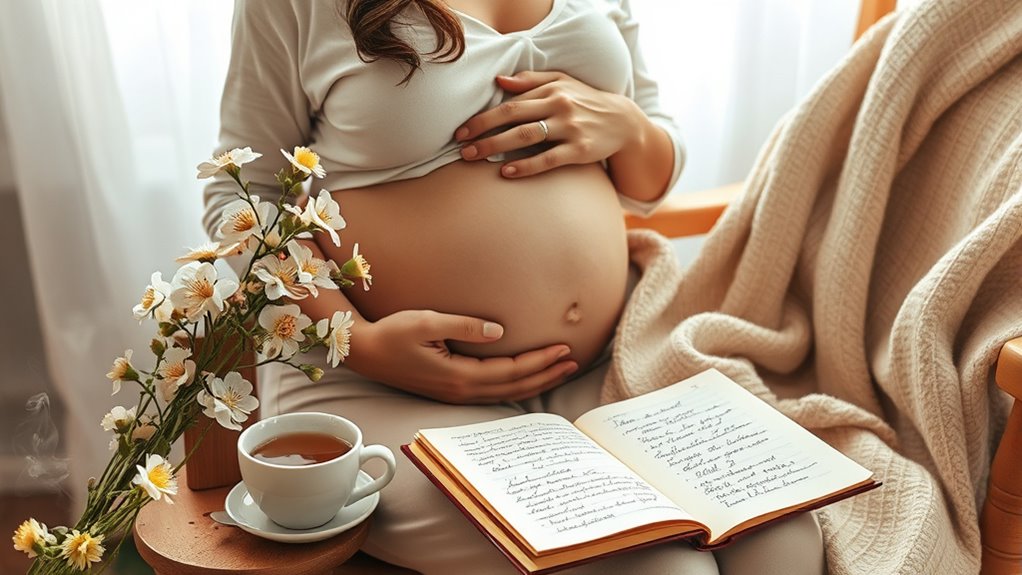
Making lifestyle changes can greatly enhance your chances of a healthy pregnancy after a miscarriage.
Focus on adopting habits that support your body and future baby:
- Maintain a healthy weight with a balanced diet and regular moderate exercise—aim for 150 minutes a week.
- Start taking prenatal vitamins or folic acid supplements before conception to guarantee ideal nutrient levels.
- Limit caffeine intake to 200 mg per day, and completely avoid alcohol, smoking, and illegal drugs to minimize risks.
Frequently Asked Questions
What Happens if You Get Pregnant Immediately After a Miscarriage?
If you get pregnant immediately after a miscarriage, your body might be ready to conceive again, as ovulation can occur quickly.
Many studies suggest that conceiving within the first three months can lead to better outcomes for your next pregnancy.
However, you may face challenges in calculating due dates.
It’s important to consult with your healthcare provider and consider your emotional readiness before trying to conceive again.
Listen to your body and trust your instincts.
Does Pregnancy After Miscarriage Feel Different?
Pregnancy after a miscarriage can feel different, and that’s completely normal.
You might experience heightened emotions, making you more aware of physical symptoms that remind you of your previous loss. This sensitivity can lead to anxiety, as you wrestle with the joy of a new pregnancy and the fear of losing it again.
How Long Does It Take to Get Over a Miscarriage Mentally?
Healing from a miscarriage can feel like maneuvering through a thick fog, where clarity seems distant.
You might find that the emotional recovery time varies greatly; some days you’ll feel ready to move forward, while others will weigh heavy with grief.
It’s common to experience a mix of emotions—sadness, anger, anxiety.
Seeking support from loved ones or professionals can help you process these feelings and find your way back to light.
Does a 6 Weeks Miscarriage Need D&C?
A miscarriage at 6 weeks doesn’t always require a D&C. Many women experience a complete miscarriage naturally without any surgical intervention.
However, if you’re facing heavy bleeding, retained tissue, or signs of infection, a D&C might be recommended to guarantee your uterus is clear.
It’s important to discuss your specific situation with your healthcare provider, who can help you decide the best course of action based on your health and circumstances.
Conclusion
As you commence your journey toward pregnancy after a miscarriage, remember that you’re not alone. Many have walked this path, like Sarah, who waited three months after her loss and then welcomed a healthy baby girl. By understanding your body, seeking support, and prioritizing your mental health, you can navigate this emotional terrain. Embrace hope and take proactive steps; a bright future is within reach. Your next chapter could be filled with joy and love.








